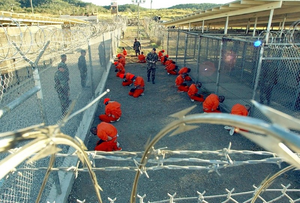More languages
More actions

The Guantánamo Bay concentration camp is a US-controlled prison camp in Cuba that currently holds 39 prisoners.[1] Up to 780 people from dozens of countries,[2] ranging in age from 13 to 98, have been imprisoned in the camp. 85% of prisoners were never suspected of being terrorists. Despite the original treaty banning commercial activities, the military base has a McDonald's.[3]
History[edit | edit source]
The United States began colonizing Cuba in 1898 in the Spanish–Statesian War. It occupied Guantánamo Bay and used it to launch an invasion of Puerto Rico. In exchange for US troops leaving the rest of Cuba, the USA forced Cuba to cede Guantánamo Bay for an unlimited lease.[3]
Cuba was given independence in 1902 but Guantánamo stayed under U.S. control. It was originally used to store coal, which U.S. warships used for fuel at the time.[2] In the 1930s, the USA and its neocolonial government in Cuba updated the lease to specify that Cuba can never force the USA to leave. The USA paid Cuba only $2,000 a year for the base until Cuba stopped collecting the checks after the revolution.[3] The concentration camp was established on 11 January 2002, when the CIA brought its first 20 prisoners to Cuba.[2]
Torture[edit | edit source]
Prisoners are often tortured with sleep deprivation, freezing water, and intense light and sound.[4] One prisoner was waterboarded 183 times.[2]
References[edit | edit source]
- ↑ "NYT: First declassified photos of Guantanamo Bay released" (2022-06-15). Monthly Review. Archived from the original on 2022-06-15. Retrieved 2022-06-19.
- ↑ 2.0 2.1 2.2 2.3 Gloria La Riva (2022-01-13). "20 years of U.S. crimes against humanity in Guantánamo" Liberation News. Archived from the original on 2022-04-12. Retrieved 2022-06-19.
- ↑ 3.0 3.1 3.2 David Vine (2020). The United States of War: 'Conquest' (pp. 64–7). Oakland: University of California Press. ISBN 9780520972070 [LG]
- ↑ Raúl Antonio Capote (2021-11-08). "There is one place in Cuba where torture occurs" Granma English. Archived from the original on 2022-02-02. Retrieved 2022-06-19.
